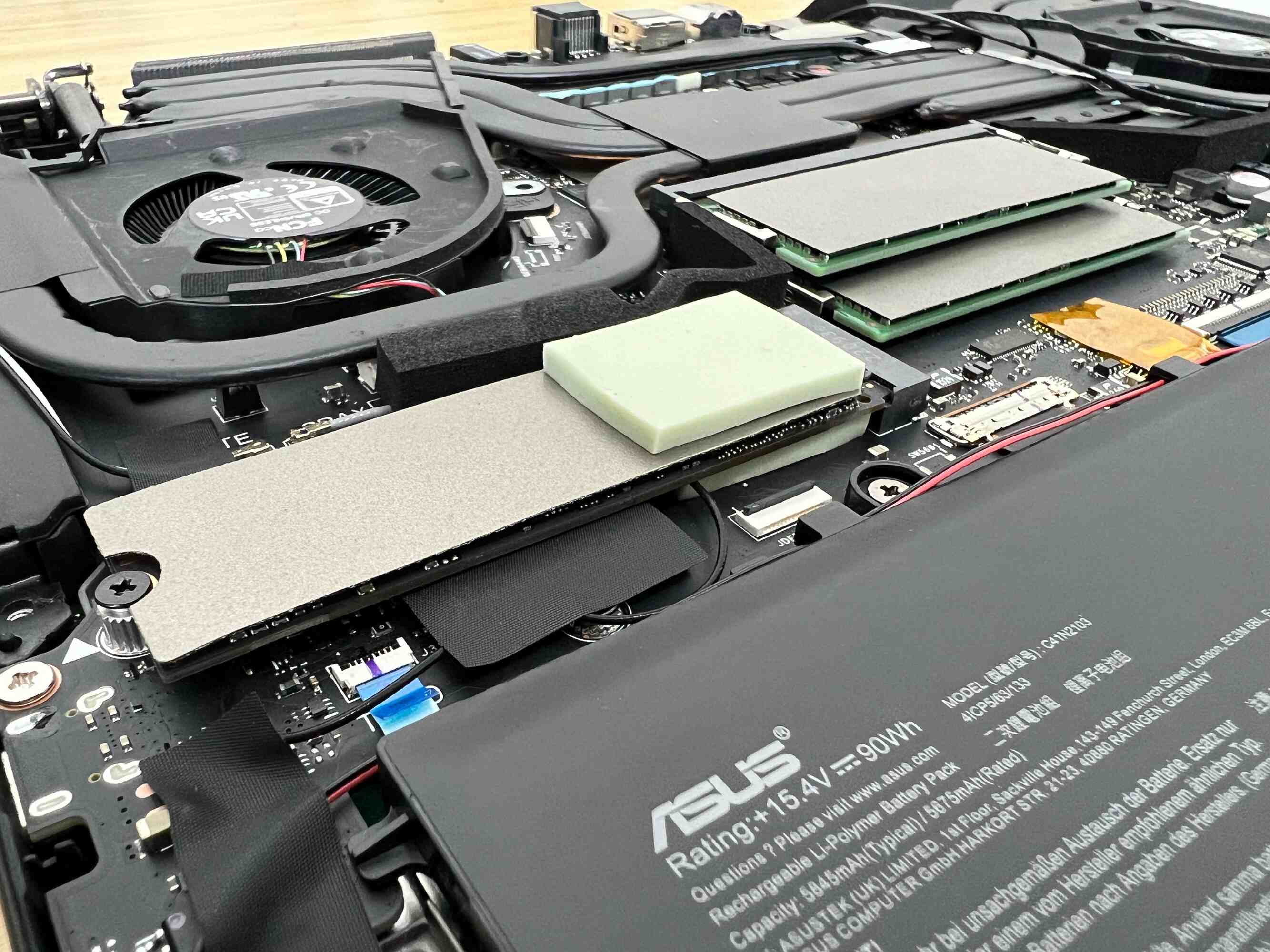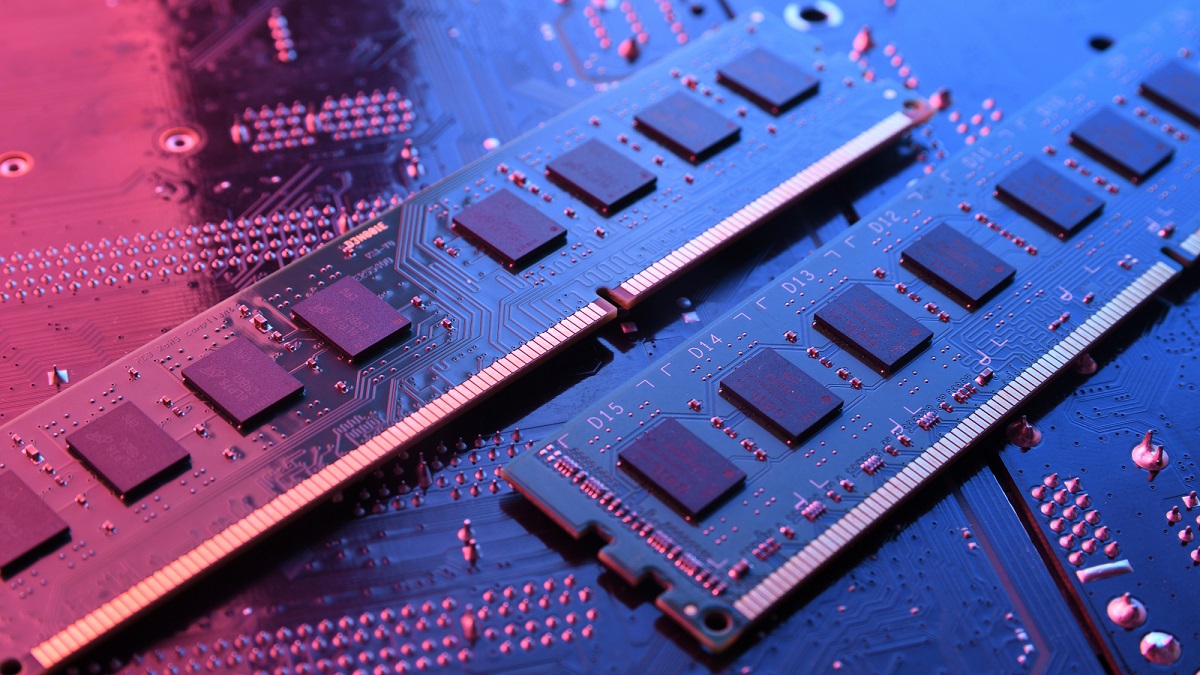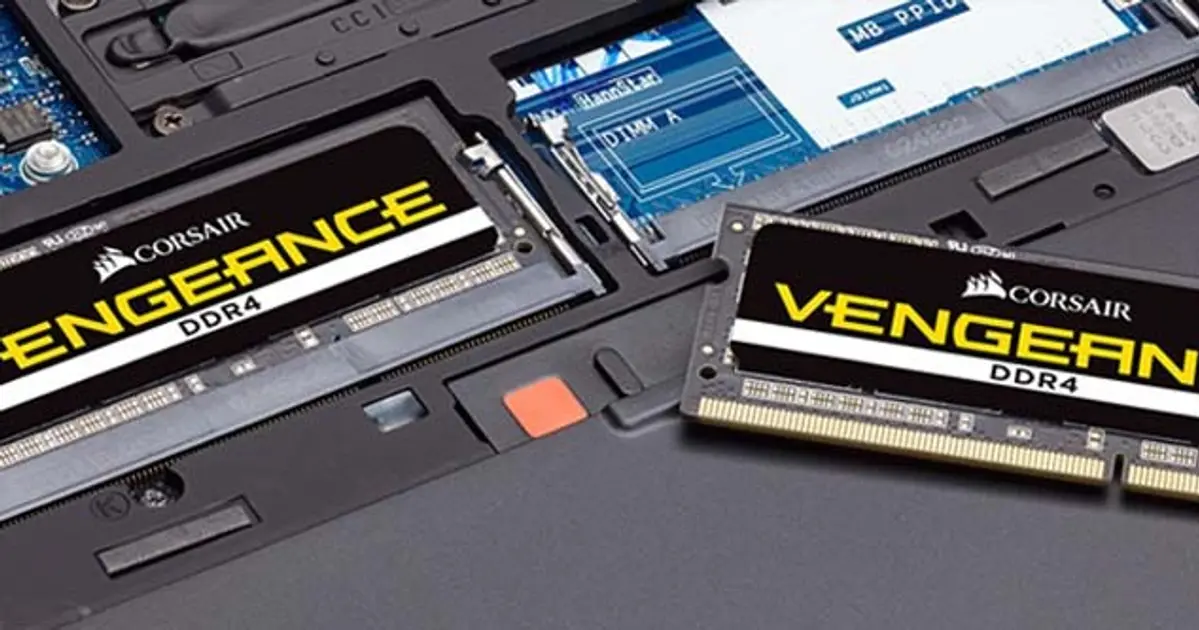Introduction
Welcome to the world of computer memory! If you’ve ever wondered how your computer stores and retrieves information, you’ve come to the right place. In this article, we’ll be diving into the fascinating world of RAM, specifically focusing on the question: “How much is 8GB of RAM?”
Random Access Memory, or RAM, is an essential component of any computer system. It plays a crucial role in determining the overall performance and efficiency of your device. Whether you use a desktop, laptop, or even a mobile device, RAM is the temporary storage medium that allows your computer to quickly access data and programs.
As technology continues to evolve, the demands placed on our computers increase. Software applications are becoming more resource-intensive, requiring more RAM to function optimally. If you want your computer to handle tasks seamlessly, having an adequate amount of RAM is crucial. But how much is enough? Specifically, what can you do with 8GB of RAM?
In the following sections, we’ll explore the importance of RAM, its role in computer performance, and whether 8GB of RAM is sufficient for your needs. We’ll also discuss potential upgrades if you find that 8GB of RAM isn’t cutting it. So, let’s dive in and demystify the world of computer memory!
What is RAM?
Before we delve into the specifics of 8GB of RAM, let’s first understand what RAM is and its role in a computer system. RAM, which stands for Random Access Memory, is a crucial component that serves as temporary storage for data and instructions that are actively being used by the computer’s processor.
Unlike the long-term storage provided by your hard drive or solid-state drive, RAM provides fast and temporary storage for data that the processor needs to access quickly. It acts as a middle ground between the slower storage devices and the lightning-fast processor, allowing for quick data retrieval when needed.
When you open software applications or run programs on your computer, the required data is loaded into RAM to ensure rapid access. This means that the more RAM you have, the more data your computer can hold at once without needing to constantly access the slower hard drive.
RAM is measured in gigabytes (GB), which indicates the amount of storage capacity it provides. Today, the most common sizes of RAM modules found in consumer computers range from 4GB to 32GB or even higher in high-end systems.
It’s important to note that RAM is volatile memory, meaning it requires a constant power supply to retain data. This is why it’s essential to save your work regularly because if your computer shuts down unexpectedly, the data stored in RAM will be lost.
In summary, RAM is a crucial component of a computer system that provides temporary storage for actively used data and instructions. It allows for quick data retrieval and plays a vital role in determining the overall performance and efficiency of your computer.
Why is RAM important?
RAM plays a crucial role in the overall performance and responsiveness of your computer. Here are a few key reasons why RAM is important:
1. Speed and Performance: Having an adequate amount of RAM allows your computer to run multiple programs simultaneously without slowing down. When you have more RAM, your computer can store and retrieve data quickly, leading to faster program loading times and smoother multitasking.
2. Multitasking: If you’re someone who likes to have multiple applications open at once, whether it’s browsing the web, editing documents, or working with multimedia, having sufficient RAM is essential. It allows your computer to switch between tasks seamlessly, reducing lag and ensuring a smooth user experience.
3. Gaming: For gamers, having enough RAM is vital for an enjoyable gaming experience. Many modern games require a significant amount of RAM to load and store game assets, textures, and other data. With inadequate RAM, you may experience lag, stuttering, and overall poor gaming performance.
4. Multimedia Editing: If you work with multimedia applications like video editing or graphic design software, having ample RAM is crucial. These applications often require a large amount of data to be loaded into memory for quick access. Insufficient RAM can lead to slow rendering times, freezing, and crashes during resource-intensive tasks.
5. Future-Proofing: As technology advances and software becomes more resource-demanding, having more RAM than the minimum requirements can help future-proof your computer. Investing in a bit of extra RAM now can save you from the hassle of upgrading in the near future when new software releases require more memory.
In summary, RAM is important because it directly impacts the speed, performance, multitasking capabilities, gaming experience, multimedia editing, and future-proofing of your computer. Having enough RAM ensures that your computer can handle the demands of modern software and provides a smooth and efficient user experience.
How much is 8GB of RAM?
When it comes to RAM, the amount you have can have a significant impact on your computer’s performance. So, how much is 8GB of RAM, and is it considered sufficient?
8GB of RAM refers to 8 gigabytes of memory. Gigabyte is a unit of digital storage that represents a billion bytes. In the context of RAM, 8GB is considered a moderate amount of memory for most average users. It provides enough capacity to handle everyday tasks such as web browsing, document editing, multimedia playback, and even some light gaming.
For the majority of users, 8GB of RAM is more than enough for basic daily activities. It allows for smooth multitasking, seamless web browsing, and running applications without experiencing significant slowdowns. It strikes a good balance between affordability and performance.
However, it’s important to note that the required amount of RAM can vary depending on your specific needs and usage patterns. If you engage in more demanding tasks such as intense gaming, video editing, or running resource-intensive software, you may benefit from having more than 8GB of RAM.
Additionally, the RAM requirements of software and operating systems can change over time. As new versions and updates are released, they may require more memory to run optimally. Therefore, while 8GB of RAM is currently considered sufficient for most users, it’s always a good idea to consider your future needs and potential software upgrades.
If you find that your computer frequently runs out of memory, leading to slowdowns or insufficient performance, it may be an indication that 8GB of RAM is not enough for your specific use case. In such cases, upgrading to a higher capacity, such as 16GB or 32GB, can provide a noticeable boost in performance and allow for smoother operation of resource-intensive applications.
In summary, 8GB of RAM is considered a good amount of memory for most average users. It provides sufficient capacity for everyday tasks and allows for smooth multitasking. However, the amount of RAM you need ultimately depends on your specific needs and usage patterns, so it’s essential to assess your requirements before making a decision.
Is 8GB of RAM enough?
The question of whether 8GB of RAM is enough depends on your specific needs and usage patterns. While 8GB of RAM is considered sufficient for most average users, there are certain factors to consider when determining if it will meet your requirements.
For everyday tasks such as web browsing, email, word processing, and streaming media, 8GB of RAM is more than enough. It provides ample memory for these activities and ensures smooth performance without any noticeable slowdowns.
However, if you engage in more demanding tasks that require significant memory usage, such as gaming, video editing, 3D rendering, or running virtual machines, you may benefit from having more than 8GB of RAM. These activities can quickly consume a large amount of memory, and having additional RAM will allow for smoother operation and better performance.
Another factor to consider is the operating system and software requirements. Certain operating systems, especially newer versions, may impose higher memory demands. If you’re using memory-intensive software applications, it’s essential to check the recommended system requirements to ensure that 8GB of RAM will be sufficient.
Besides the current requirements of your activities, it’s also crucial to consider future needs. Technology is constantly evolving, and software applications are becoming more resource-intensive over time. Investing in more than 8GB of RAM now can help future-proof your system and prevent the need for an upgrade in the near future.
Additionally, if you are a power user or someone who often works with multiple applications simultaneously, having more RAM can significantly enhance your multitasking capabilities. It allows you to switch between programs seamlessly without experiencing any lag or slowdowns.
In summary, 8GB of RAM is generally sufficient for most average users and everyday tasks. However, if you engage in memory-intensive activities like gaming, video editing, or running resource-heavy applications, or if you want to future-proof your system, you may want to consider upgrading to a higher capacity RAM. Assessing your specific needs and considering the potential requirements of the software you use will help determine if 8GB of RAM will be enough for you.
What can you do with 8GB of RAM?
With 8GB of RAM, you have enough memory to handle a wide range of tasks and activities. Here are some common things you can do with 8GB of RAM:
- Web Browsing: With 8GB of RAM, you’ll be able to browse the internet smoothly and seamlessly. You can open multiple tabs, run web applications, and switch between websites without experiencing any significant slowdowns.
- Word Processing and Spreadsheets: If you use your computer for document creation or spreadsheet work, 8GB of RAM is more than enough. You can comfortably work with multiple files, edit large documents, and perform calculations without encountering performance issues.
- Media Streaming: 8GB of RAM allows for smooth streaming of high-definition videos and audio content. Whether you’re watching movies, streaming music, or enjoying online content, your computer will have sufficient memory to handle the multimedia demands without buffering or lag.
- Photo Editing: Basic photo editing tasks can be comfortably carried out with 8GB of RAM. You’ll be able to open and edit images in popular editing software without experiencing significant delays. However, for more complex editing or working with large files, additional RAM may provide a smoother experience.
- Light Gaming: 8GB of RAM is sufficient for running most casual and low-demand games. You’ll be able to play popular titles, indie games, and older games without encountering major performance issues. However, for more demanding and graphically intensive games, upgrading to a higher RAM capacity might be necessary.
It’s important to note that the tasks mentioned above are just a few examples of what you can do with 8GB of RAM. The precise performance and capabilities may vary depending on other factors such as the processor, graphics card, and storage speed of your computer.
In summary, 8GB of RAM allows you to comfortably perform common tasks like web browsing, word processing, media streaming, photo editing, and light gaming. While it might not be sufficient for highly demanding activities or resource-intensive applications, it provides ample memory for most average users and ensures a smooth overall experience.
Can you upgrade from 8GB of RAM?
If you find that 8GB of RAM is no longer sufficient for your needs, the good news is that in most cases, you can upgrade your RAM to a higher capacity. Upgrading your RAM can provide a noticeable boost in performance and allow you to handle more demanding tasks. However, there are a few factors to consider before proceeding with an upgrade.
First, you need to determine whether your computer has available RAM slots for expansion. Most desktop computers have additional slots for adding more RAM modules, while laptops may have limited or non-upgradable RAM configurations. To find out, you can consult your computer’s user manual or visit the manufacturer’s website for specifications and compatibility information.
Next, you need to check the type and speed of your existing RAM modules. It’s crucial to ensure that the new RAM you purchase is compatible with your system. This includes factors such as the DDR generation (e.g., DDR3 or DDR4), the maximum supported capacity, and the speed (measured in MHz) of the RAM modules. Mixing incompatible RAM modules can lead to system instability or failure to boot.
Once you have determined the compatibility, you can decide on the desired capacity of your upgraded RAM. The amount of RAM you choose will depend on your specific needs and usage patterns. For more demanding tasks like gaming, video editing, or running resource-intensive software, upgrading to 16GB, 32GB, or even higher may be beneficial. However, it’s important to note that adding more RAM than necessary will not necessarily result in a significant performance boost.
When you’re ready to upgrade, you can purchase the appropriate RAM modules from reputable manufacturers or authorized retailers. To install the new RAM, carefully follow the instructions provided by the manufacturer. It typically involves shutting down the computer, opening the case (for desktops), inserting the RAM modules into the available slots, and securing them in place. For laptops, the process may vary, and it’s advisable to refer to the manufacturer’s instructions or consult a professional if needed.
After the installation, it’s recommended to boot up your computer and verify that the new RAM is recognized and functioning correctly. You can check the system information or use specialized software to ensure that the upgraded RAM is detected and operating at the expected speed.
In summary, upgrading from 8GB of RAM is possible in most cases, but it’s essential to consider compatibility, available slots, and your specific needs before proceeding. Upgrading your RAM can significantly enhance system performance and allow for more demanding tasks, but be sure to research and follow proper installation procedures to avoid any issues or damage to your computer.
Conclusion
In this article, we have explored the fascinating world of RAM and specifically looked at the question of how much 8GB of RAM is worth. We learned that RAM is a crucial component of a computer system, providing temporary storage for actively used data and instructions. Having an adequate amount of RAM is important for ensuring smooth performance and efficient multitasking.
We discussed that 8GB of RAM is generally considered sufficient for most average users and everyday tasks. It allows for smooth web browsing, word processing, multimedia streaming, and light gaming. However, more demanding activities such as video editing or running resource-intensive software may benefit from higher RAM capacities.
If you find that 8GB of RAM is no longer meeting your needs, the good news is that in most cases, you can upgrade to a higher capacity. Upgrading your RAM can provide a noticeable boost in performance and allow you to handle more demanding tasks. However, it’s important to consider factors such as compatibility, available slots, and your specific requirements before proceeding with an upgrade.
Remember to thoroughly research and consult user manuals or manufacturer websites to ensure that you are purchasing compatible RAM modules. Follow proper installation procedures and verify that the new RAM is recognized and functioning correctly after installation.
In conclusion, 8GB of RAM is a good starting point for most users, providing sufficient memory for everyday computing tasks. However, it’s essential to assess your specific needs and usage patterns to determine if additional RAM is necessary. With the right amount of RAM, you can unlock the full potential of your computer and enjoy a seamless and efficient user experience.

























